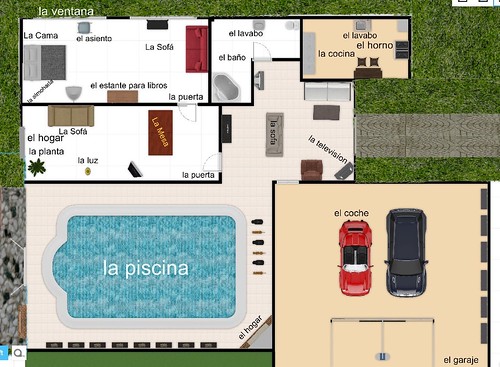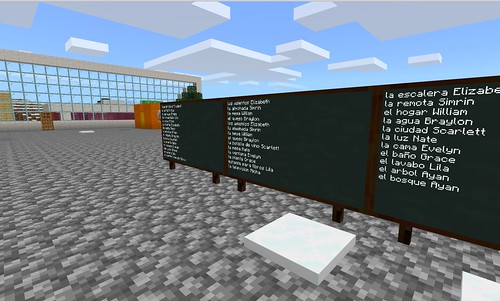Designing And Narrating a Dream House Tour in Spanish
Author: Wesley Fryer
Go to Source
This semester, for a variety of reasons, I’m having the opportunity to teach two classes of introductory 5th grade Spanish in addition to our 5th and 6th grade Media Literacy classes. 5th graders at our school take a semester of Spanish and a semester of French, and based on those experiences decide which language to continue studying in 6th, 7th and 8th grade, and possibly beyond. I’ve been facilitating a variety of projects with my students this semester, and our last one has been a “Spanish Dream House Tour.”
Rather than design a physical house on a posterboard or shoebox diorama, we’ve used free “basic” accounts on FloorPlanner.com. Students are able to login using their school-provided Google accounts. To build our Spanish vocabulary of household objects, I initially shared a “movie talk” with students using a clip from “Incredibles 2,” and we built a vocab list together of about 30 words. We also played a Kahoot I made using icons from The Noun Project, “El Vocabulario de La Casa.” Then students selected fifteen of those words which they created and labeled in their “dream house” created on FloorPlanner.com. There are about 150,000 different objects in the available library, so there are lots of options to choose from!
On the lesson plan for this project on my curriculum sharing website, I’ve included several tutorial videos. These include a 4 minute tutorial about how students can record their tour (in Spanish, of course) using a script and Screencastify.
I also included a 90 second sample tour of a FloorPlanner.com house design I created, which mysteriously does NOT include a kitchen. (I guess in one version of my dream house, we eat meals each day exclusively via UberEats!)
Some of my students REALLY got into this project, spending hours of their own time (outside of class) adding additional rooms and details to their FloorPlanner.com designs. After recording their dream house tours in Spanish using Screencastify on their Chromebooks, they shared those videos both with me in Google Classroom and with their parents and peers via our Seeesaw Learning Journals.
We had some trouble this year getting our Minecraft Education software in our iMac computer lab to connect for interactive building and projects, but finally resolved those issues last Friday! Today, when my students completed their Spanish narrated house tours, they started building a collaborative house in Minecraft Education. Students are labeling their assigned house elements using either a regular Minecraft Sign, or a “slate,” which is a special type of small sign in Minecraft Education Edition. I used a “board” to share student building assignments, which is the largest type of “chalkboard” in Minecraft EE.
We’re having a lot of fun together in 5th grade introductory Spanish class this year. Hopefully my students are not only learning some new Spanish vocabulary and developing their ability to understand basic Spanish sentences, but also associating both fun and contagious enthusiasm for learning Spanish beyond this short semester we’re together!
Many thanks to Aric Sappington, our 7th and 8th grade MakerSpace teacher, who suggested FloorPlanner.com when I told him about this project I wanted to facilitate with students! Also thanks to Damaris Castro, our other 5th grade Spanish teacher, who shared an analog version of this lesson idea with me and inspired this digital version.
One more thing: I wanted my students to be able to repeatedly hear me pronouncing the different words of our narration script, and practicing those words, before recording their own tour. For the first time, we successfully used the free Google Chrome extension Mote, and I used it to record VOICE COMMENTS in a Google Doc copy of our narration script template. Mote is great and worked well! I did have to share EDITING access to the Google Doc for students to view / play / listen to my voice comments. I’m going to be experimenting with and using Mote more in the weeks ahead!
If you enjoyed this post and found it useful, consider subscribing to Wes’ free, weekly newsletter. Generally Wes shares a new edition on Monday mornings, and it includes a TIP, a TOOL, a TEXT (article to read) and a TUTORIAL video. You can also check out past editions of Wes’ newsletter online free!
Did you know Wes has published several eBooks and “eBook singles?” 1 of them is available free! Check them out! Also visit Wes’ subscription-based tutorial VIDEO library supporting technology integrating teachers worldwide!
MORE WAYS TO LEARN WITH WES: Do you use a smartphone or tablet? Subscribe to Wes’ free magazine “iReading” on Flipboard! Follow Dr. Wesley Fryer on Twitter (@wfryer), Facebook and Google+. Also “like” Wes’ Facebook page for “Speed of Creativity Learning“. Don’t miss Wesley’s latest technology integration project, “Show With Media: What Do You Want to CREATE Today?“


